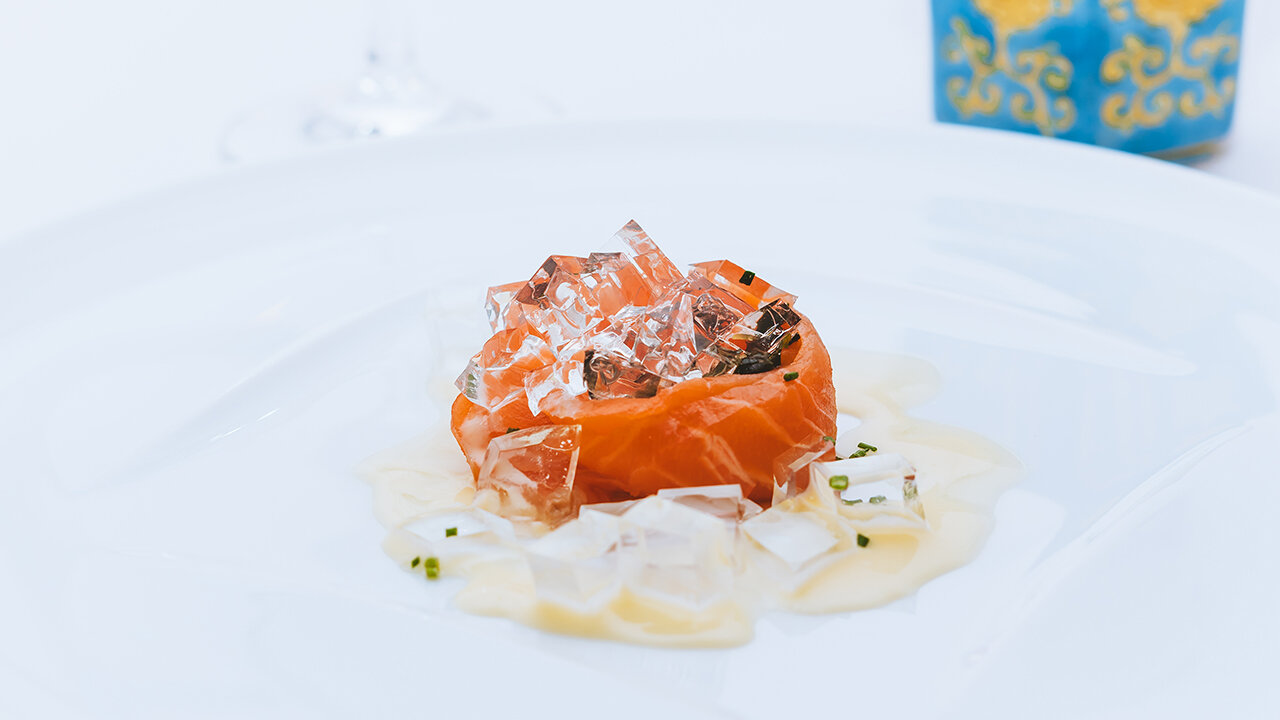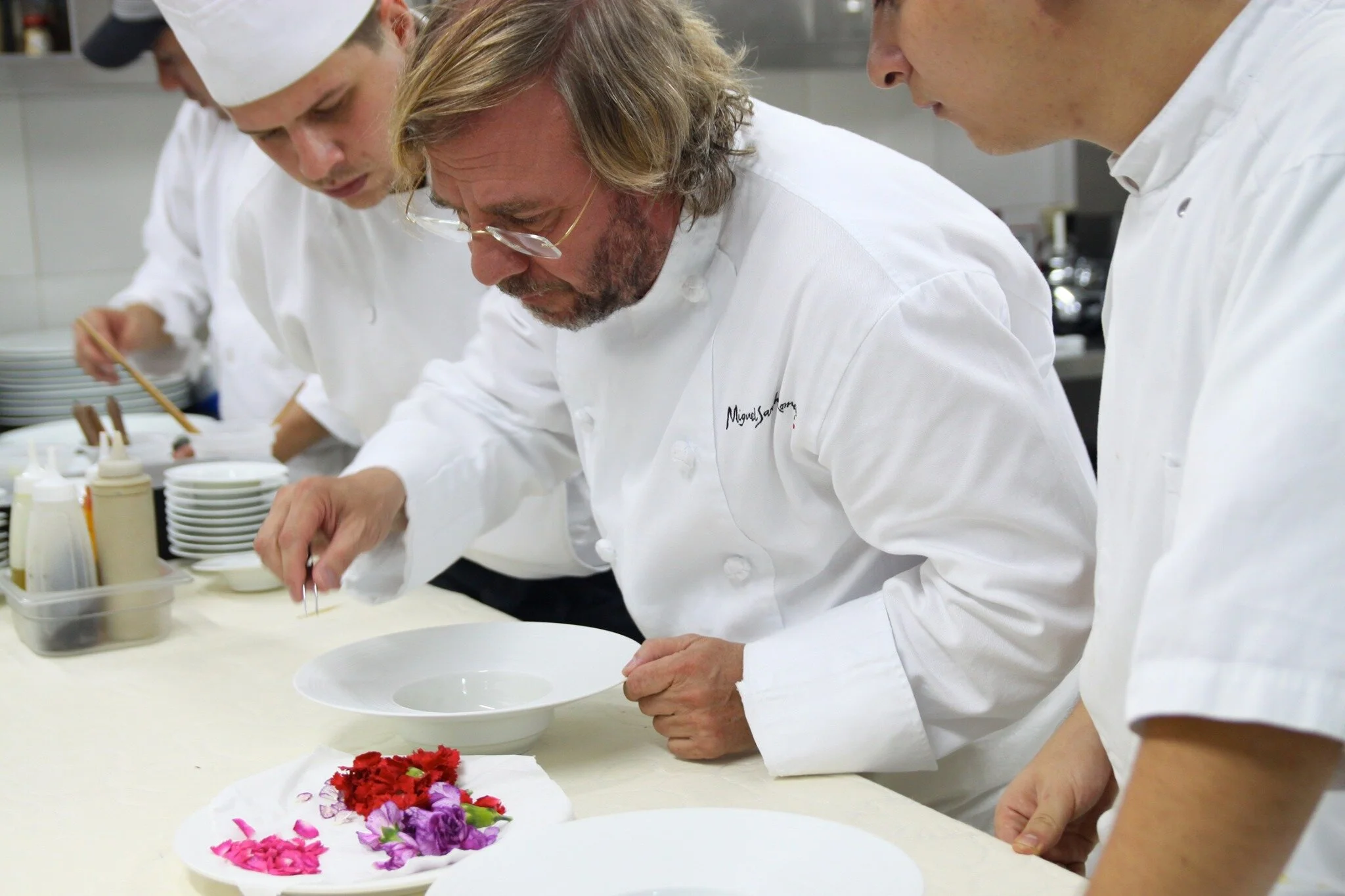Restaurant L’Esguard | Mallorca 2020
Sommelier

Beauty has its price: time consuming, laborious, and flawless mis-en-place.

If Miguel has an ace up his sleeve, it would be his control of temperature. While the 'sea water rocks' melt on contact with body temperature, causing an incredible velvety sensation, the salmon is home-smoked just below body temperature, resulting in an extremely delicate and flavor preserving texture.


Oyster tartar with vanilla and onion cream. Low cooking temperature, increased pressure and low ph helps to release the onion's sweet flavors, while circumventing harsh and sulphuric traces.


A personal souvenir from Japan hinting at the triune origin of L'Esguard: science, health and art.


Hommage to Miró: Mallorcan olive oil coupage with summer notes to be dipped with North-African flatbread from the wood-fire oven

Beetroot rice with cod and tosaka-seaweed. The microcosm of seaweed remains beyond my understanding.

Criollo chocolate foil with strawberry and rose meringue below. And some gold dust.

Coquelet poached in 206-year-old Chinese stock, handed over 7 generations.


Fotos: Oliver Brenneisen, ABC Mallorca

Explosive fruit sorbet on peach mousse without any added sugar; a refreshing delight.
Alongside Maître Agustí Peris, and Chef-Owner Dr. Miguel Sanchez Romera, a Neurologist turned Chef, we opened Restaurant L’Esguard on the North-Eastern Shores of Mallorca
The result is an epic Odyssey through the world of senses, merging Miguel’s background in medicine and arts into an idiosyncratic and evolving cuisine.
A great intellect at work.
Info about Chef Miguel Sanchez Romera (from his LinkedIn profile)
“Miguel Sanchez Romera, creator of the concept of Neurogastronomy, above all is a creator of emotions and feelings, who, guided by his scientific character, aspires to amazing perfectionism in his culinary preparations in which chromaticism and geometry form a partnership to bring us closer to the magnificent world of surprise and pleasure, not forgetting a type of taste delirium created by a brilliant and exceptional technique and an unimaginable creative spirit.
He is specialized in Neurology and Clinical Neurophysiology and has dedicated his time to the study of epilepsy, publishing and participating in numerous conferences and scientific societies around the world.”
Fast Forward 200 Years
A few days before opening, Miguel stormed through the dining room in full extacy, calling everybody to haste into the kitchen. And there it was: an incredibly thick, deep, almost black yet kind of shimmering, bubbling liquid on top of the stove.
Upon closing in on the pot by just a meter, wow …
… an overwhelming aroma, all the way from ocean breeze to hung meat; from mediterranean shrubby fields to the nectar of asian tea plantages; from heady alcohols and fruity esters, to sulfurous and smokey roasted-meat thiols; from caramel-sweet sotolon, cocoa-like methylbutanal, woody-floral mix of terpenoids, potato-like methional to volatile aromas that give the all-too-familiar impression of the dusty and aging smells of time itself, encapsulated in ancient egyptian burial crypts…
Getting a headache from my ramblings, Miguel let us in on his secret: as an honor for his neurogastronomic consultancy in Beijing and Shanghai, he received a 205-year-old stock!
Yep, you read it correctly. The stock is more than two centuries old. So what it is comprised of? Well … no one really knows.
For over seven generations(!), this family-owned master stock called Lou Mei, has been used to poach different varieties of chicken, then replenished, and continued to develop its own timely character according to the evolving customs. Some generations may have put more emphasis on spices, some other more emphasis on vegetables, mushrooms as well as different types of rice wine, vinegars, seaweed, and soy sauces. In either case, this master stock is not only a rare artifact and virtually impossible to find an equal match outside China, but also an incredible engagement with your senses. An edible celebration of heritage, Sauerkraut can only dream of.
The many conversation which ensued between us about culture, understanding of heritage and provenance in China and Japan, my provocation about ‘imagined communities’ à la Max Weber, ancestral North-African rituals of stretching and folding techniques for flatbread, the important distinction between aptitude and attitude derived from Miguel’s work experience in NYC, concepts such as Umami (no, it’s not simply an impression of “pleasant savoriness”. Our perception of texture is inextricably linked with it), was absolutely unique.
A magnificent encounter with a chef who has also the mind of a (conversational) professor.
The daily scientific half an hour mini-lectures, yet heartful debates, and many sensually engaging tasters, have given me a much deeper understanding of the reciprocal relationship between culinary arts and the merits of rigorous science.
Sapere aude!
Can you imagine … this stock’s predecessor was already 15+ years old, when the first lawn mower was invented in 1830??
Me neither! What grotesque times it must have been.
And even before the invention of man-made plastic in 1862 … wait what? Does that imply the existence of nature-made plastic? Pst, please don’t think out loud or some Querdenkers will make nature responsible for all human misery at last.
Also not even the light bulb could have shed light on the initial secret ingredients of this master stock as it was still 30 years out and a few miles away from China…And although plenty of lanterns and madmen were around at that time, no genius was born yet to proclaim God’s untimely death… yeah most of us know that one though (in case you haven’t met the madman yet, click here).
…so how about we conclude with the following instead:
Ernst nehmen.
Der Intellekt ist bei den allermeisten eine schwerfällige, finstere und knarrende Maschine, welche übel in Gang zu bringen ist: sie nennen es »die Sache ernst nehmen«, wenn sie mit dieser Maschine arbeiten und gut denken wollen – oh wie lästig muß ihnen das Gut-Denken sein! Die liebliche Bestie Mensch verliert jedesmal, wie es scheint, die gute Laune, wenn sie gut denkt: sie wird »ernst«! Und »wo Lachen und Fröhlichkeit ist, da taugt das Denken nichts« – so lautet das Vorurteil dieser ernsten Bestie gegen alle »fröhliche Wissenschaft«. – Wohlan! Zeigen wir, daß es ein Vorurteil ist!
Friedrich Nietzsche, Die Fröhliche Wissenschaft (1887)
—
Taking seriously.
In the great majority, the intellect is a clumsy, gloomy, creaking machine that is difficult to start. They call it “taking the matter seriously” when they want to work this machine and think well. How burdonsome they must find good thinking! The lovely human beast always seems to lose its good spirits when it thinks well; it becomes “serious”. And “where laughter and gaiety are found, thinking does not amount to anything”: that is the prejudice of this serious beast against all “gay science” – Well then, let us prove that this is a prejudice.
Friedrich Nietzsche, The Gay Science (1887) - translated by W. Kaufmann

